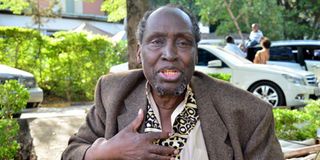Ngugi homage to Catalonia and our nationalist politics

Author Ngugi wa Thiong'o gestures during an interview on February 7, 2019
What you need to know:
- The recognition of Ngugi by the Catalonia government, and his decision to speak in Gikuyu during the function, are thus logical products of a long running political and ideological global war.
Ngugi’s use of Gikuyu in Catalonia spoke first, to the politics of literary awards; second, to the role of literature in nation formation and, only thirdly, to the politics of language.
Over 80 years since George Orwell’s Homage to Catalonia was published, Kenyan writer and thinker Ngugi wa Thiong’o was in Catalonia to receive the Catalonia International Prize for “his distinguished and courageous literary work and his defense of African languages, based on the notion of language as culture and collective memory.”
Orwell, in Homage, wrote about his experiences in the trenches of the Spanish Civil War at a time when Euro-America was wrestling with the spread of fascism on the one hand, while colonies were pushing for civil nationalism, on the other.
Both events, Orwell’s publication of Homage to Catalonia, and the ceremony honouring Ngugi in Catalonia, show the critical role that language plays in setting the beacons of political consciousness, self-affirmation, and the serious business of nation formation.
As most people would know, Catalonia has, since the mid-20th Century, been pushing for separation from Spain, using language and cultural difference as the core argument for their agenda.
Cultural imperialism
And as most people would also know, Ngugi has spent most of his adult life arguing that the world is awash with mega-projects of cultural imperialism, and that one’s mother tongue is the most effective tool that one can use to capture their experiences, celebrate their humanity, and claim their space in an Anglicised and dollarised world, thanks to Britain’s mass export of its language, and America’s stranglehold on global economy.
The recognition of Ngugi by the Catalonia government, and his decision to speak in Gikuyu during the function, are thus logical products of a long running political and ideological global war, especially in Europe, where ethnic tensions have been cleverly glossed over by less loaded dictions relative to how similar dynamics are described in Africa and the global South generally.
I think that what emerged from Ngugi’s speech in Gikuyu at the Catalonia event was a different strand of the politics of language and literature. Ngugi’s Gikuyu speech was not necessarily for the same reasons that he has been advocating for the use of mother tongue in literary writing; it was a symbolic gesture of ideologically supporting the Catalonian separatist agenda.
Language agenda
After all, Ngugi has spoken in countless forums pushing the language agenda, but using the English language.
Therefore, Ngugi’s use of Gikuyu in Catalonia spoke first, to the politics of literary awards; second, to the role of literature in nation formation and, only thirdly, to the politics of language.
First, discourses on literary awards has recently emerged as a core area of study for literary scholars who seek to understand the political and other dynamics that underpin recognition of literary works and figures in world generally and their reception in specific geopolitical spaces.
For instance, there was a stir in Africa when Soyinka was awarded the Nobel in 1986, when more African scholars then thought that Achebe had done more for African literature, especially via his classic Things Fall Apart.
Literary prizes
It is now agreed that literary prizes may well recognise what could well be the best that has been thought and written, in the Arnoldian sense, but it is also widely accepted that owners of these prizes decide what to do with them and who to do that with.
Ngugi’s creative and critical works are, of course, highly respected for their stylistic nuance and consistent ideological standpoints. That explains why he stands tall among other global literary icons.
But the works also reflect an ideological slant that coheres with that of the Catalonia people, whose desire to live separate lives from their current Spanish compatriots could be helped by a global voice that has consistently argued that our being is affirmed by our primary languages.
That voice is Ngugi wa Thiong’o’s, a globally acclaimed writer who came of age at a time when the world of letters embraced the idea that conscientious writers ought to show practical commitment to the ideas that they espouse.
For clarity, I am not saying that Ngugi was awarded this prize on the basis of his ideological positioning; my view is that Ngugi’s literary depth notwithstanding, it would have been difficult for him to attract that award but for the ideological underpinning that resonates with the wider Catalonian nationalistic aspirations.
The second point hints at long running debates on how nations are willed to existence. It was Benedict Anderson who, in his widely cited Imagined Communities, argued that nations are not naturally occurring entities, but are products of collective imagination and self-fashioning that manifest in shared experiences and hopes, all contained in the literary and media outputs of a people.
For Anderson, all great nations have literatures that capture their experiences, on their terms and in their languages. And as Obi Wali polemically stated in “The Dead End of African Literature”, Germany has literature in German, and Russia has great literature in Russian. Granted, German, Russian, or any other nationalist literatures do not necessarily draw their greatness merely from their languages, but you get the point.
Ideological backing
Knowing this, I think, the Catalonia government’s celebration of Ngugi was thus a mnemonic gesture of encouragement to Catalonians that their struggles for separation from Spain have an ideological backing from an intellectual force of Ngugi’ stature. That it was okay, in fact necessary, to extend their narratives in their own languages, as a way of advancing the cause of their nation formation.
It is a position that is both assuring to those who need to state their identities clearly, and one that disrupts Spain’s – and much of Europe’s – narrative of national unity.
That a small part of Europe can be so ruggedly determined to assert its linguistic and cultural difference from a dominant (and perhaps domineering) neighbour also points at the dynamism of nation formation even in Europe, which has for long positioned itself as the global metaphor of order.
Yet, this ideology of order, in Cohen and Ationo-Odhiambo’s phrase, has always been achieved through domination by language – which is colonialism in other words – a state of being that can be remedied by a strategic return to the foundations of linguistic and cultural sites of freedom that ethnic languages offer.
That Ngugi spoke in Gikuyu in Catalonia, and that the government of Catalonia recognised him as the most suited recipient of its highest national honour, demonstrates the doability of the final push towards decolonization, and the attainment of ultimate freedom that can be enabled by and archived in ethnic languages.
The writer teaches at the University of Nairobi.





